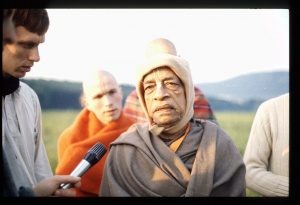CC Madhya 24.325 (1975)

A.C. Bhaktivedanta Swami Prabhupada
Below is the 1996 edition text, ready to be substituted with the 1975 one using the compile form.
TEXT 325
- muñi—nīca-jāti, kichu nā jānoṅ ācāra
- mo-haite kaiche haya smṛti-paracāra
SYNONYMS
muñi—I; nīca-jāti—belong to a lower caste; kichu—anything; nā—not; jānoṅ—I know; ācāra—about proper behavior; mo-haite—from me; kaiche—how; haya—there is; smṛti-paracāra—propagation of the directions of Vaiṣṇava behavior.
TRANSLATION
“I am a most lowborn person. I have no knowledge of good behavior. How is it possible for me to write authorized directions about Vaiṣṇava activities?”
PURPORT
Actually Sanātana Gosvāmī belonged to a very respectable brāhmaṇa family. Nonetheless, he submitted himself as a fallen, lowborn person because he had served in the Muslim government. A brāhmaṇa is never supposed to engage in anyone’s service. Serving others for a livelihood (paricaryātmakaṁ karma (BG 18.44)) is the business of śūdras. The brāhmaṇa is always independent and busy studying śāstra and preaching śāstra to subordinate social members such as kṣatriyas and vaiśyas. Sanātana Gosvāmī felt unfit to write Vaiṣṇava smṛti about the behavior of Vaiṣṇavas because he had fallen from the brahminical position. Thus Sanātana Gosvāmī clearly admits that the brahminical culture should be standardized. Presently in India, so-called brāhmaṇas are almost all engaged in some mundane service, and they do not understand the import of the Vedic śāstras. Nonetheless, they are passing themselves off as brāhmaṇas on the basis of birth. In this connection, Sanātana Gosvāmī declares that a brāhmaṇa cannot be engaged in anyone’s service if he wants to take a leading part in society. In Śrīmad-Bhāgavatam Nārada Muni states that even if a brāhmaṇa is in a difficult position, he should not accept the occupation of a śūdra. This means that he should not be engaged in service for another, for this is the business of dogs. Under the circumstances, Sanātana Gosvāmī felt very low because he had accepted a position of service in the Muslim government. The conclusion is that no one should claim to be a brāhmaṇa simply by birthright while engaging in someone else’s service.